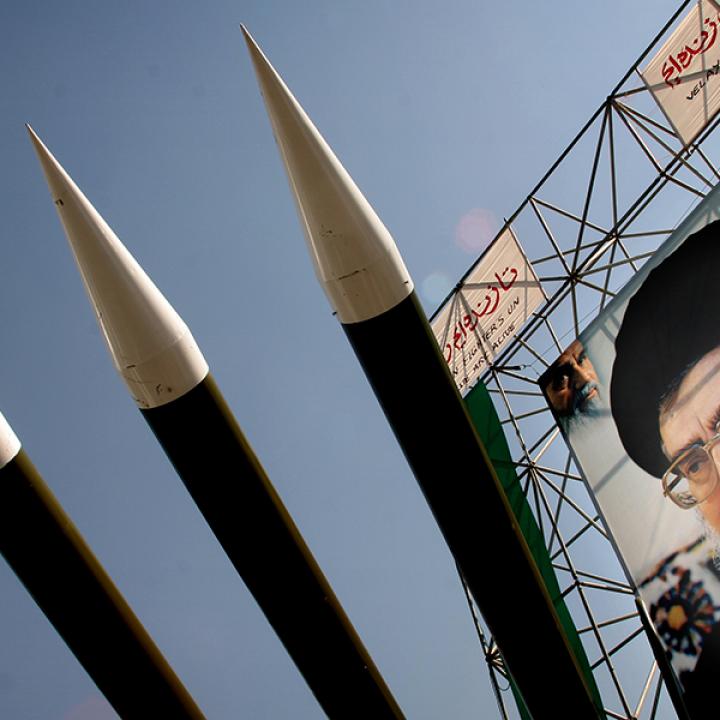
- Policy Analysis
- Articles & Op-Eds
We Should Not Let Euphoria About the Iran Nuclear Deal Cloud Our Judgment

Complacency could put regional security at greater risk, so the international community must not drop its guard against an emboldened regime.
While the P5+1 negotiators in Vienna celebrate the nuclear deal with their Iranian counterparts, across the Middle East there is an atmosphere of gloom. In Israel, coalition and opposition -- who rarely agree on anything -- are now united in deep concern about the long-term implications for Israel and the region.
Israel was not a participant in these negotiations, but its national security will be impacted more than anybody else's. After all, Iran combines ideological commitment to Israel's destruction with nuclear ambitions and the ability to project violence and instability through proxies on Israel's borders and around the world. It is Israel whose elimination the Iranian supreme leader proudly tweets about. It is Israel that is targeted by tens of thousands of rockets supplied by Iran to armed groups on our borders, including Hezbollah, Hamas and Islamic Jihad.
How will the agreement impact on these intentions and capabilities? As these lines are written, the full details of the deal still need to be digested. Not everything is yet clear, and questions abound regarding inspections, R&D, addressing the military dimensions of Iran's programme and sanctions relief. Nonetheless, the main contours are known.
True, the deal pushes Iran back from the ability to quickly "break out" to nuclear weapons, and is likely to reduce its incentive to do so, for the next decade or so. However, in the second decade Iran is legitimised as a nuclear threshold state, by allowing it to expand and upgrade its enrichment programme and reduce the breakout time almost to zero.
Will time bought by the deal serve to positively change Iran's current policies or will it instead empower them? Most Middle Easterners assume the latter and refuse to bet on the former. While the clock is ticking down until Iran can expand its uranium enrichment capacity, the impact of the deal will likely pour fuel on the fires of the region.
First, the lifting of financial and trade sanctions is likely to empower Iran, both politically and economically, in pursuing its radical and sectarian agenda. This includes arming and bankrolling designated terror organisations, propping up Bashar al-Assad in Syria (Iran has already spent billions of dollars on that under sanctions), fueling the sectarian conflict in Iraq, arming rebels in Yemen, and threatening the security of a number of Gulf Arab states.
Second, the legitimising of Iran's nuclear threshold status threatens to spark nuclear proliferation across the region, with other states seeking the same status as Iran.
Third, the financial windfall coming to Iran may spark a conventional arms race. Iran will invest more in its arms industry, and with sanctions on arms sales to be lifted within five to eight years, it can be expected to go on a major shopping spree, with Russia as a willing supplier. Gulf states will not stay left behind.
As gloomy as this prospect is for those of us on the sharp end, now is not the time to despair. The closing of the agreement is a dramatic watershed, but not the final word. The international community must now focus on two vital issues.
The first is the rigorous implementation of the deal itself. The P5+1 powers (the five permanent members of the UN Security Council plus Germany), and especially the US, must ensure that effective measures will be taken against any kind of violation. Iran must get the message that it will pay a swift and heavy price if it tries to cheat, as it has so often in the past.
Second and no less important is re-establishing effective deterrence against Iran's dangerous non-nuclear policies which are outside the scope of the agreement. Since the deal focuses on nuclear issues to the exclusion of all other aspects of Iran's dangerous policies, the distinction should be maintained in the post-deal reality. This means confronting such policies rather than turning a blind eye to them for fear of upsetting the nuclear deal.
On Friday, in the run-up to the deal, Iranians celebrated "Al-Quds (Jerusalem) day," an annual holiday devoted to Israel's destruction. Flags of the US, Britain, and Israel were burned in the streets, followed by chants of "death to...," and a new video game was unveiled simulating an Iranian missile strike on Israel.
Israel and its Arab neighbours are alarmed by the huge contrast between these scenes and the euphoric celebrations surrounding the deal. They expect friends around the world not to be blinded by their euphoria, and to work together to contain an emboldened Iran.
Brig. Gen. Michael Herzog, IDF (Ret.), is The Washington Institute's Milton Fine International Fellow. He previously served as head of the IDF's Strategic Planning Division and chief of staff to Israel's minister of defense.
Guardian



